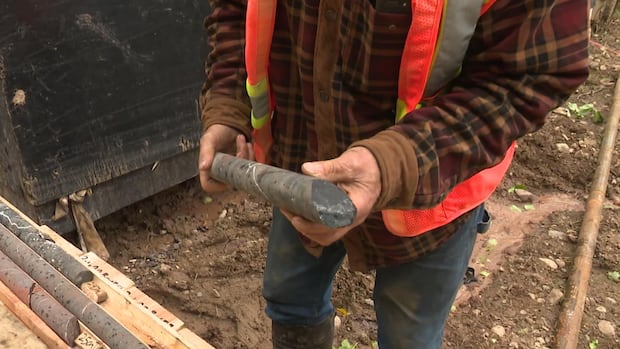In a vast quarry on New Brunswick’s north shore, Réjean Carrier looks up at towering walls of ashen-grey rock, cut deep into the landscape.
“We have this presence of volcanic ashes in a zone around Dalhousie,” he explains in French, pointing out a rock called pozzolan. “It will bring good jobs to the area.”
Carrier, president of Quebec-based Carboniq Inc., hopes to turn an existing quarry into an open mine to extract the material as a low-carbon alternative for the cement industry.
His vision is to take the pozzolan from a small mountain, process it at a plant in the area, and export it globally using nearby port and rail lines.
Residents on New Brunswick’s north shore are divided over a proposal to operate an open-pit mine in the community of Dalhousie. While many are embracing the potential for a boost to the struggling economy, others fear the project could harm the environment.
The existing rock quarry has operated as a non-conforming use within Dalhousie town boundaries but is much smaller than the project Carboniq imagines.
In the community of Dalhousie, the prospect of a new mine is raising questions over how to balance the economic benefits with potential impacts on the environment.
The community has faced economic struggles in recent years, struggling to reinvent itself after the loss of three major industries. The closure of a paper mill, a chemical plant and a power generation station has led to shuttered businesses and a declining population.
The idea of a new mine is being embraced by some residents, with talk of hundreds of jobs during construction and as many as 168 once the processing plant is in operation. But others fear an open pit mine, near a school and residential areas, could impact their quality of life and harm the environment.

Mayor Normand Pelletier said residents have lots of questions and the developers will have to make their case to the community. He said people are divided on the issue.
“We have a lot of people that are interested and would like to see a project as such take place,” he said. “For one, it’s going to create good-paying jobs.
“We’re kind of anxious to hear the company and how they’re going to promote it and make those public consultations to ease the pressure on the citizens.”
Volcanic rock
The natural resource is the result of the region’s prehistoric past. Four hundred million years ago, Sugarloaf Mountain in nearby Campbellton was a volcano. As it spewed ash across the landscape, it created layers of pozzolan rock.
At the Dalhousie site, studies have revealed the deposit of rock is deep enough to last at least 100 years, according to the developers.
Pozzolan is now being looked at as a potential solution to drastically lower emissions in cement manufacturing. In current mixtures, limestone is added to a kiln and decomposes under high heat, which produces greenhouse gas emissions. But with pozzolan, that step in the process is avoided entirely.

The material is currently being extracted at some sites in the western United States and around the Mediterranean Sea.
The project has received backing from the federal government. In 2022, the Atlantic Canada Opportunities Agency made a conditionally repayable contribution of $1.2 million to cover geological and environmental surveys.
Carrier is working on the project with Guy Rousseau, president of cement company Cimbec Canada. The pair launched their venture in 2022.

Carrier said the geological analysis of the deposit has been completed and the project is now focused on how pozzolan might need to be processed to meet the needs of the industry. The rock is being tested in a laboratory.
“The demand will increase because we’re searching for products to decarbonize the production of cement,” he said.
‘It’s going to leave a scar in the landscape’
The municipality of Heron Bay held a public meeting last month to discuss new zoning, including changes that would allow quarries and mines to operate in parts of the community of Dalhousie.
Residents filled the room to question councillors about the project, raising concerns about noise, dust, truck traffic and pollution. Many demanded more information about the mine, questioning why they haven’t heard directly from the developers.
Gail Fearon, who spoke at the meeting, said she wants to see greater transparency so her community can make an informed decision.
“My problem is yes it’s jobs, but a job at what expense?” she said in an interview, overlooking post-industrial brownfields on the community’s waterfront.

Fearon said the project could lead to a permanent impact on the environment and the potential consequences need to be seriously considered. Growing up in the community, she remembers seeing waste from the paper plant being released into the bay.
“The industries that left, they left at least a flat piece of property. Whereas this project, it’s going to leave a scar in the landscape,” she said.
Carrier said he is listening to residents and recognizes some have questions and concerns. But he said it’s too early to bring plans to the public for feedback. The project is still in a planning stage.

“We don’t want to design a project in public, but we are taking these concerns into account, from an environmental survey, a social acceptance survey,” he said.
Carrier said a walking trail near the top of Dalhousie Mountain will not be affected, since the geological deposit stops well before that point in the landscape. He said possible impacts to neighbours could be controlled and mitigated.
“We’re making the plan taking into account the different constraints imposed, that citizens impose, the environment imposes, laws impose,” he said.




